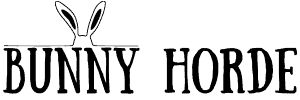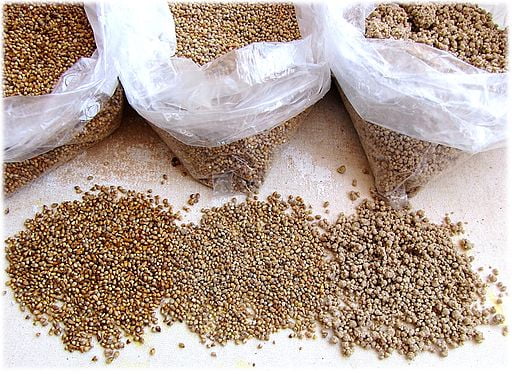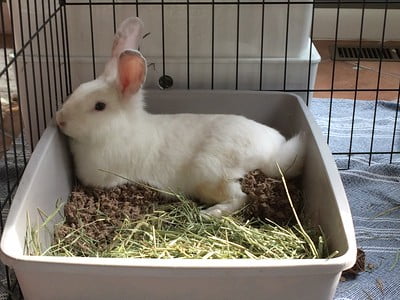Last Updated on March 10, 2023 by Marjon Ramos
Rabbits in the wild tend to survive without having any of the pellets or specialized food that we give to our pet rabbits.
But, wild rabbits also eat a variety of fruits, herbs, and vegetables that give them all the nutrients they need.
Dr. Mark Burgess of Southwest Veterinary Hospital in Beaverton says it’s difficult for average rabbit owners to feed their pets the right mix of food (vegetables, alfalfa hay, timothy hay, herbs, etc.) to ensure long-term health.
Rabbit pellets are needed to deliver the right balance of nutrients to your pet rabbit’s diet for good health.
Rabbits that are on a pellet-free diet are prone to nutritional health problems like rickets (vitamin D deficiency).
Never cheap out on your rabbit’s pellets. Most cheap brands are high in carbs and have inadequate nutrients.
Your rabbit’s pellets should have a standardized formula to effectively deliver the nutrients that hay and veggies alone cannot provide.
Now that I’ve given you the gist of the article, read on as I explain in more detail why rabbits need pellets:
Table of Contents
How long can a rabbit survive without pellets?

Rabbits that are not eating pellets would likely survive for a long time.
The majority of their diet should consist of high-quality grass hay and small amounts of fresh leafy greens.
Pellets should only account for 10% of their diet.
Pellet’s main job is to deliver all the missing nutrients from your rabbit’s main diet.
So, as long as you are feeding your rabbit the proper amount of quality hay and vegetables, they should survive for a long time.
Vegetables can also provide the missing nutrients that hay alone can not provide.
It’s just that it’s really hard for the average rabbit owner to find the right mixture of vegetables, fruits, and herbs to provide their pet with all those essential nutrients.
How much pellets do rabbits need?
The amount of pellets a rabbit needs depends on a variety of factors, including its weight and age.
Here’s a calculator to help you determine the proper portions of pellets to feed your rabbits, depending on their age and weight.
Diet Portion Calculator For Rabbits
As you can see from the calculator above, the only time you should let your rabbit eat unlimited pellets is when they’re young (7 weeks to 7 months).
Feeding young rabbits a lot of pellets would make sure that they get the nutrients they need to grow as quickly as possible.
Then, when your rabbit is 7 months old, you need to cut down the amount of pellets you give them to small quantities ( ½ cup per 6 lbs of body weight).
Finally, adult rabbits only need limited quantities (½ cup per 6 lbs) of pellets.
What can you feed your rabbit instead of pellets?
If you really don’t want to feed your rabbits pellets, you need to feed them a variety of vegetables and herbs every day.
That’s the only way to prevent any nutritional deficiencies your rabbit might experience when you want your rabbit’s diet to be pellet-free.
You essentially need to copy what wild rabbits eat. Wild rabbits will eat all kinds of fresh and dried grasses and plants.
They would also eat a variety of fruits, seeds, and twigs that they could get their hands on.
We don’t recommend that you do this, though; there’s too much room for error. You might accidentally feed too many vegetables or herbs in lieu of hay.
Rabbits that are eating too much supplementary food in lieu of hay may develop problems in their digestive tract as a result of a lack of fiber in their diet.
Besides, rabbit pellets are not that expensive.
The average price per pound for a good-quality rabbit pellet on Amazon is $2.8.
While rabbits would need 11–252 grams of pellets per day depending on their breed.
A small breed of rabbit would cost you $1.96–$16 per month for their pellets.
A medium-sized breed of rabbit would cost you $11.48–$36.4 per month for their pellets.
A large breed of rabbit would cost you $17.36–$46.48 per month for their pellets.
You can read more about the cost of feeding your rabbit here.
Conclusion
Rabbit pellets are needed to deliver the right balance of nutrients to your pet rabbit.
Rabbits that are not eating pellets are prone to nutritional deficiencies like rickets (vitamin D deficciency).
It is possible to not feed your rabbit pellets. But, you need to feed them the right mix of vegetables, herbs, and fruits.
This is difficult and unnecessary for the average pet owner.
Cite this article:




